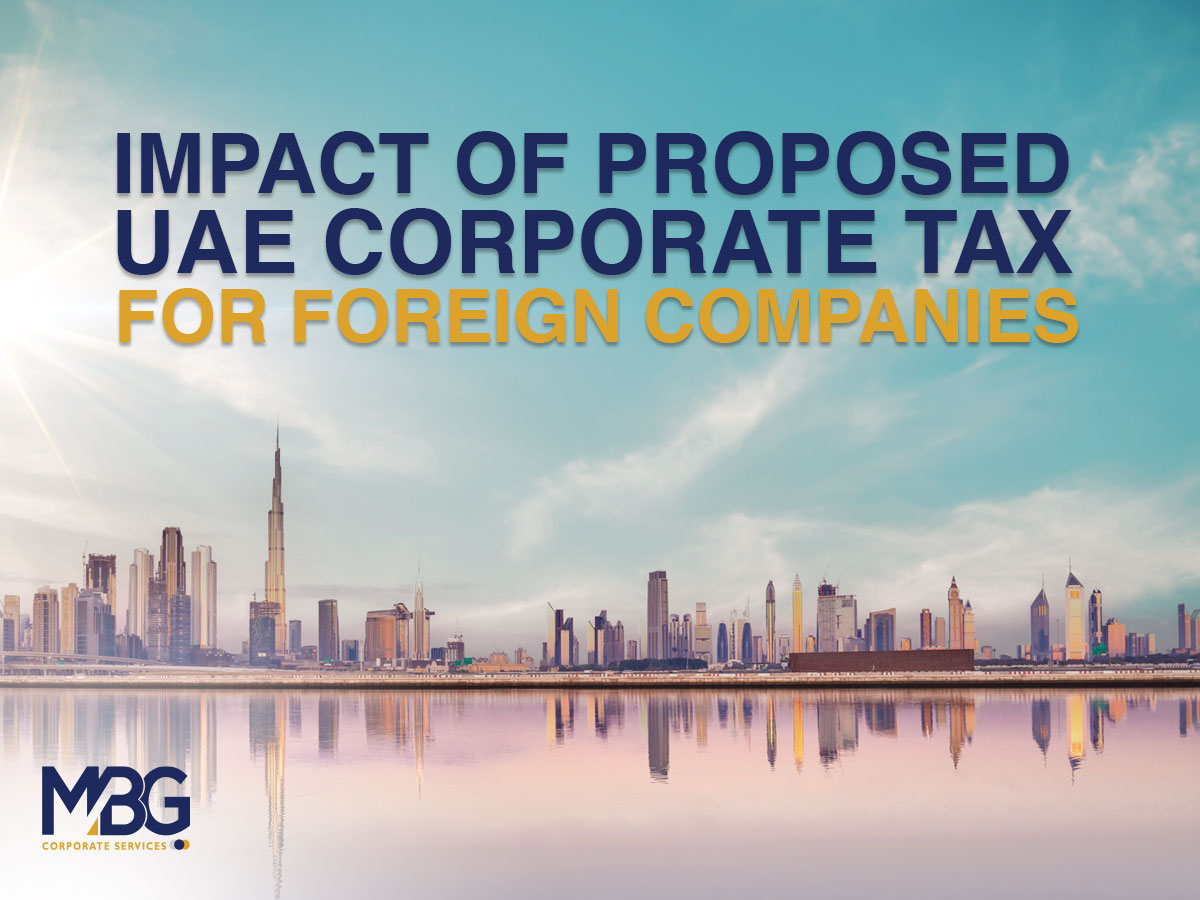Impact of Proposed UAE Corporate Tax for Foreign Companies
August 16, 2022

The newly introduced corporate tax in UAE is soon to become reality. With only 10 months to go for the effective date of 1 June 2023, most organizations doing business in the UAE have started deliberating the impact of the proposed Corporate Tax in UAE on their business models to ensure a smooth transition.
In this article, we provide a brief insight into the applicability and impact of the UAE’s corporate tax for foreign companies. We highlight some key aspects from the perspective of a permanent establishment a concept that is commonly found in Double Taxation Avoidance Agreements between the UAE and other countries (‘tax Treaties’ hereafter) and which will be the premise for corporate tax for foreign companies in UAE.
Under the proposed corporate tax regime, foreign companies which have in the UAE
- Their Permanent Establishment (‘PE’); or
- Their Place of Effective Management; or
- Their source of income
will be subject to the UAE corporate tax rate of 9% on annual taxable income exceeding AED 375,000 attributable to UAE business operations and activities.
These foreign companies are at par with domestic companies for the applicable UAE corporate tax rate of 9%, unless a multinational corporation earns a consolidated global revenue in excess of EUR 750 million ( approx. AED 3.15 bn), in which case, a higher tax rate may apply. The return on investments and project bidding should be carefully assessed in such cases.
Permanent Establishment
The concept of PE or Permanent Establishment is stated in widely used tax treaties and also appears in the domestic laws of many countries. The primary use of this concept is to determine the right of a source country to tax the profits of a foreign company. For example, the business operations of a company resident in Country R are protected from taxation in the source Country S as long as the activities of the company resident in Country R do not create a PE in the source Country S.
The UAE corporate tax proposes to introduce the concept of PE in its domestic law by using the following two general tests:
- Fixed place of the business test; and
- Dependent agent test.
- Fixed Place of Business Test :
A fixed place is generally a place of management, branch, office, factory, workshop, etc. However, no fixed place PE comes into existence if, in the above example:
- the activities of the company in Country R are carried out through the fixed place in the UAE (say, Country S in the above example) are preparatory or auxiliary in nature; or
- the fixed place is used only to store, display or deliver, and keep stock of goods for processing.
- Existence of place of business;
- The place of business must be at the disposal of the foreign company;
- The place of business must be fixed, i.e., established in a distinct place with a certain degree of permanence;
- The business of the foreign company must be carried on through the fixed place of business; and
- It should not get covered by the exceptions indicated aforesaid.
- Dependent Agent Test: A dependent agent PE is created when a foreign company (say Country R in the above example) operates in the UAE (say Country S in the above example) through a dependent agent and such agent habitually exercises the authority to negotiate and conclude contracts on behalf of the foreign company without any material intervention from the foreign company. An exception to this test is an agent that does not work exclusively for a foreign company and is truly legally and economically independent from the foreign company. Typically, the conditions that must be satisfied to demonstrate that an agent is an independent agent are as follows:
- He/she should be acting in the ordinary course of his/her business;
- His/her activities should not be devoted wholly or almost wholly on behalf of the foreign company for whom he/she is acting as an agent; and
- The transactions between the foreign company and the agent should be at arm's length.
Key aspects in the context of PE
- What constitutes preparatory and auxiliary in nature?
The proposed UAE Corporate Tax regime provides general guidance to determine which activities undertaken by a foreign company in the UAE would have a preparatory or auxiliary character. It indicates that activities performed in preparation or in support of more substantive business activities of a foreign company are covered under preparatory and auxiliary. It also provides an illustrative list of activities such as limited marketing and promotional activities, performing market research, and attending seminars or conventions to be covered under the preparatory and auxiliary nature of activities.
While the proposed UAE Corporate Tax for Foreign Companies provides the aforesaid guidance on what constitutes preparatory or auxiliary, it can be seen that there is no standard formula.
Further, preparatory and auxiliary activities viewed in isolation may be covered in the exceptions of fixed place PE but when combined together, they may form part of the cohesive business operation of a foreign company and therefore crucial for determining if there is any PE exposure.
Thus, a detailed fact-finding analysis of all the activities of the UAE office of the foreign company should be undertaken, inter-alia, from the following perspectives to determine if the activities are in fact preparatory or auxiliary in nature or not:
- Roles and responsibilities of the employees of the UAE office in contract negotiation and finalization;
- Significance and proportion of the activities performed in the UAE vis-à-vis the overall business of the foreign company
- Nature of expenses incurred by the UAE office;
- Any sales incentive plans provided to the employees of the UAE office by the foreign company basis achievement of sales targets in the UAE;
- Point of contact for customers in the UAE.
- Whether Representative or Liaison offices constitute PE
Representative or Liaison Offices are generally not allowed to carry on any business in the country where they are established. They merely act as a point of contact between the company and the customers in the other country and carry out activities of exchange of information, and therefore, generally and in the ordinary course get covered within the ambit of a preparatory or auxiliary set of activities.
However, in the case of the representative or liaison office, it is advisable to evaluate if the activities are in fact preparatory or auxiliary in nature by undertaking the fact-finding analysis as indicated in point 1 above.
- In the case of the existence of PE in the UAE, how will the profits be attributed to such PE?
The foreign company will be required to undertake an analysis to determine the profits attributable to the permanent establishment in the source country. Typically, the profits attributed to the PE will be those profits the PE would have expected to generate if it were a separate and independent enterprise carrying out the same or similar activities in the same or similar conditions, taking into account functions performed, and assets used and risks assumed. For this purpose, guidance may also be drawn from internationally accepted policies and OECD guidelines.
Way forward
While we await the fine print of the law which is expected to provide detailed guidelines/ clarifications, it is imperative that foreign companies conducting business in the UAE, through any form of presence, inter-alia, evaluate their existing business models, long-term agreements/contracts, intragroup and cross-border transactions, etc. to assess the impact from a PE risk perspective and undertake appropriate group level and/or transaction level restructuring to mitigate potential PE exposure, if any, before the implementation of corporate tax in UAE.
Disclaimer
The information contained in this document is for general information purposes only. We make no representation or warranties of any kind, express or implied, about the completeness, accuracy, reliability, suitability, or availability with respect to the document or the information provided therein. We reserve the copyright of this document and hence, do not allow anyone to sell, re-publish or re-distribute the document or derivatives thereof.
This document is prepared on perusal of the public consultation document issued by the Ministry of Finance, UAE on 28th April 2022 and internationally accepted principles and rules, which do not represent the final legislation; hence, it should not be relied upon for making individual or business decisions.
The much-awaited Federal Decree- Law 47 of 2022 on "Taxation of Corporations and Businesses" is issued! Click to know more about Corporate Tax Law
For any Corporate Tax, enquiry contact us at- +971 526406240 or Email us at:- [email protected]
Article contributed by:
Corporate Tax team - UAE








